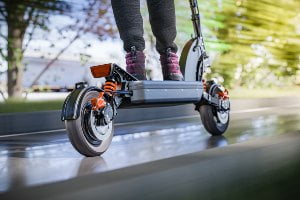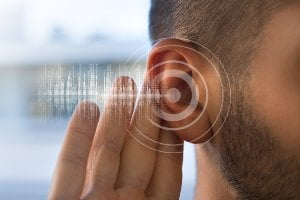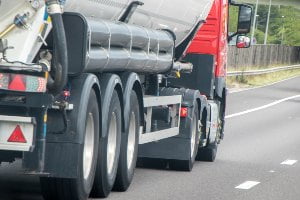Can I Obtain Compensation if I Was Injured in a Minnesota E-Scooter Crash?

Since they first arrived in the Twin Cities in 2018, electric scooters (e-scooters) from companies like Lime, Spin, Lyft and JUMP have skyrocketed in popularity. While riding these devices is fun, it is also a convenient and cheap way to get around. However, many people forget to consider the safety risks and potential for sustaining severe injuries.
In October 2023, the U.S. Consumer Product Safety Commission released a report revealing that the number of e-scooter injuries rose 22 percent in 2022 compared to the previous year.
While e-scooter riders can suffer severe injuries in various types of crashes, they are also a risk to pedestrians. When crashes happen, drivers and scooter rental companies may bear liability for injuries and damages.
TSR Injury Law may be able to help e-scooter crash victims recover compensation for their damages, and there are no upfront costs involved. We have been strong advocates for the injured in Minnesota for decades, securing more than $1 billion for our clients.
Have legal questions after an e-scooter accident? Call for assistance: (612) TSR-TIME.
What Kinds of E-Scooter Crashes May Be Eligible for Compensation?
Whenever someone suffers an injury because of another’s negligence, there may be grounds for legal action. This can include injuries from e-scooter crashes. The Minneapolis car accident lawyers at our firm are prepared to help e-scooter crash victims secure compensation.
E-Scooter vs. Car Crashes
Despite the widespread use of e-scooters, drivers often fail to keep an eye out for riders, particularly when drivers are going through intersections or making turns and entering crosswalks. Far too often, drivers are distracted and don’t think to look out for pedestrians, much less e-scooter riders.
Drivers need to be particularly cautious when turning right on a green light as e-scooter riders may be crossing the road while drivers are completing their turns.
Scooter riders are permitted to ride on any street, but drivers might not give riders enough space when passing, which could result in a rider getting clipped by the side of a car.
E-Scooter vs. Pedestrian Crashes
E-scooter riders are not permitted on sidewalks, but sometimes riders break the law, putting pedestrians at risk. E-scooter riders also need to watch for pedestrians when crossing the street.
E-Scooter vs. Bicycle Crashes
E-scooters are allowed on bike paths in Minnesota, so there is a possibility of a crash with a bicyclist. E-scooter operators may be inexperienced and struggle to keep the vehicle under control, which could result in a crash with a bicycle rider.
Defective E-Scooter Crashes
Sometimes riders are injured because the scooter itself is defective. For example, the brakes might not work like they are supposed to, or the scooter might start accelerating without the rider increasing the throttle.
If you were injured in any of these types of collisions through no fault of your own, you may be eligible to file a personal injury claim. Contact TSR Injury Law to learn more about your rights.
Who Could Be Held Liable for an E-Scooter Accident?
Liability will depend on multiple factors unique to the accident, but the following parties often bear liability for these incidents:
- Drivers – Car drivers may be liable for being distracted, violating an e-scooter rider’s right of way, or not leaving enough room when passing.
- E-scooter riders – Riders may have been going so fast they could not avoid hitting a pedestrian or bicycle rider. They may have also been distracted or lost control of the vehicle. Inexperienced riders may fail to check for traffic before crossing a road, not leaving drivers time enough to stop to avoid a crash.
- Scooter rental companies – These companies may have knowingly put defective or malfunctioning vehicles in circulation or failed to fix an issue that scooter users had previously complained about.
It may also be possible to hold a city or municipality liable for a crash caused by a roadway defect, like a pothole or road construction.
Is There Insurance for an E-Scooter Crash?
If you were injured in a collision with a car, you may be able to seek compensation from the driver’s liability insurance. Injured bicyclists and pedestrians may be able to seek compensation from the rental company that provided the scooter, as these companies often have liability insurance to cover damages caused by scooter riders.
Riders may wonder about whether they can use their no-fault auto insurance coverage, but these policies generally do not cover electric scooters.
Most injury claims are resolved through an insurance settlement. However, it may be possible to sue the scooter company if a scooter involved in a crash was found to be defective. These companies have a legal responsibility to take defective or malfunctioning scooters out of circulation or fix them. When products are unreasonably dangerous when being used as intended, rental companies may bear liability for damages that result.
Minnesota Laws on Riding E-Scooters
E-scooters first came to the Twin Cities in the summer of 2018. Since then, Minnesota has passed laws to regulate scooter rental companies, along with the riding and parking of these vehicles. These laws are meant to help e-scooter riders safely share the road with cars, pedestrians and bicyclists.
- Scooter riders have all the rights and duties as bicyclists.
- E-scooters may not be operated on sidewalks unless it is necessary to enter or leave property adjacent to a sidewalk.
- It is illegal for anyone under the age of 12 to ride an e-scooter.
- People between the ages of 12 and 18 must wear a properly fitted and fastened helmet
- E-scooters must have headlights and taillights.
- These vehicles must be ridden as close to the right curb or edge of the road unless they are overtaking another vehicle heading the same direction, preparing for a left turn, or when necessary to avoid obstacles (pedestrians, bicyclists, animals, narrow lanes or fixed objects).
- E-scooters can be ridden in bicycle lanes, trails or paths that are not reserved for non-motorized traffic.
- It is illegal for more than one person to ride a single e-scooter.
Call TSR Injury Law Today to Discuss a Potential Lawsuit
Falling from an e-scooter, getting hit by a car while riding one of these devices, or getting hit by an e-scooter as a pedestrian can cause devastating injuries.
Other parties may be liable if the collision resulted from another’s negligence. Victims may be eligible to seek compensation for past and future medical costs, lost wages, and more.
The legal process can be complex and overwhelming for injured victims, but at TSR, we handle these cases every day. We have been helping injured victims to secure the compensation they need for decades, and we have the resources and staff to help you.
Experienced. Local. Lawyers. Call TSR Injury Law today: (612) TSR-TIME.


 Hearing loss is often caused by aging or prolonged exposure to loud noises, but hearing loss can also be a side effect of a car crash injury. For example, crash victims who suffered whiplash or a head injury could suffer impaired hearing.
Hearing loss is often caused by aging or prolonged exposure to loud noises, but hearing loss can also be a side effect of a car crash injury. For example, crash victims who suffered whiplash or a head injury could suffer impaired hearing.
 In Minnesota, crash victims can seek certain forms of compensation from their own insurance companies. Some victims may think they are more likely to recover full compensation if they are dealing with their own insurance company.
In Minnesota, crash victims can seek certain forms of compensation from their own insurance companies. Some victims may think they are more likely to recover full compensation if they are dealing with their own insurance company.